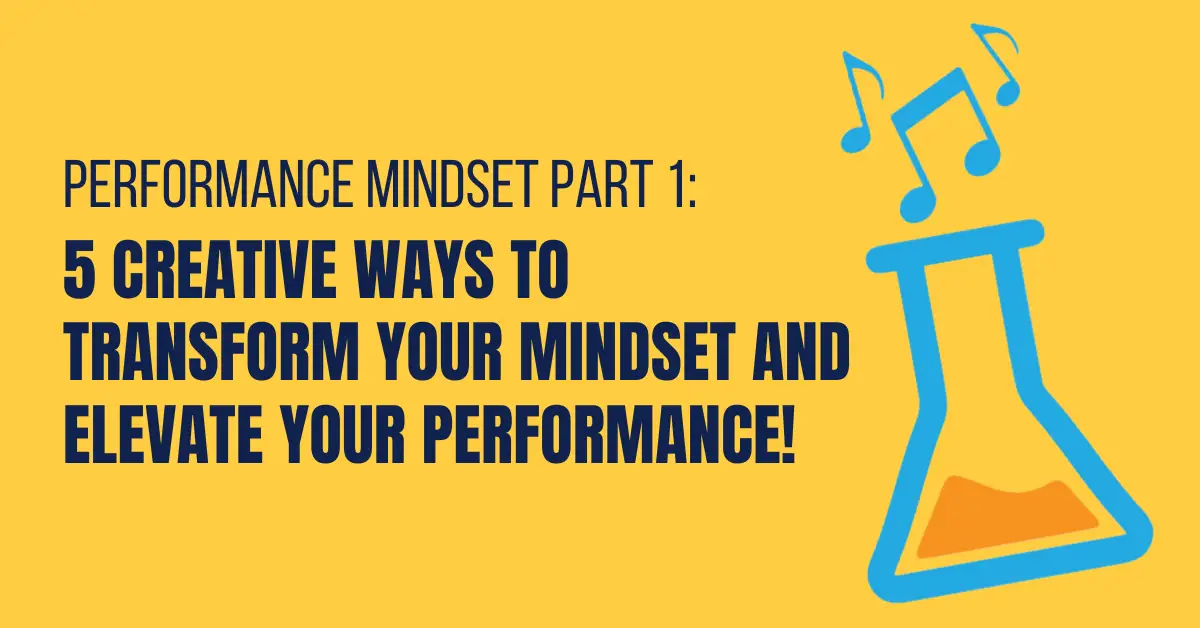Having the right mindset can be the difference between failure and success. Yet, it is often the most overlooked aspect of performance.
For most of my career I overlooked the power of my mind and how my thoughts were impacting my performance.
The more invested I was in the outcome, the more I would get in my own way.
I fell into cycles that undermined my efforts and self-confidence and put my goals farther from reach.
Recently, I’ve begun to appreciate how a small shift in mindset can have a massive impact on my efforts, enjoyment, and outcomes.
The mental strategies I will share with you here are just a few pieces of the puzzle–a web of interconnected and overlapping ideas working together to create a productive and effective mental state that allows me to do my best work.
Adapting Ideas from Elite Athletes
Many of the mental strategies we will discuss here come from recent developments in Sports Psychology.
Over several decades, more athletes have begun to incorporate mental training into their physical conditioning programs, often employing a sports psychologist as part of their training team.
These elite athletes understand the benefit of being in the right mindset during practice so they can perform at their best on gameday. These athletes also appreciate how harmful cultivating ineffective mental strategies can be. When the game is on the line, these elite performers cannot afford to be trapped in their head.
While mindset training has become commonplace among elite athletes and professional sports teams, it is surprisingly scarce elsewhere. Yet, these techniques can be used with great effect by anyone mastering complex skills and performing in high pressure environments.
These strategies work incredibly well for musicians too!
I’ve found them very useful in my own practice.
How to Apply What You’ll Learn
It takes effort to change the way you think. It will require diligent effort every time you pick up your instrument to practice or perform.
You will find that constant reminders will be necessary to help bring the new ideas you are cultivating to the front of your awareness.
You have mental habits that have been developed since childhood, some that are inherent to your personality. Therefore, in many instances you will be swimming upstream, against your basic nature.
It won’t be easy, but the benefits of this work will be well worth the effort.
In this guide, you’ll be presented with the following mental strategies
- The importance of keeping Low Expectations
- Maintaining The Right Focus
- The benefit of being Process-Oriented
- The value of setting Mini Goals
- The benefit of setting Specific Goals
- Why your first goal should be to just Show Up
Let’s begin!
Keeping Low-Expectations
The problem: Expectations are the primary source of frustration because they keep us
- Emotionally attached to our desired result
- Fixated on where we want to be
- Disconnected from where we are right now.
The solution: We must keep low expectations in order to
- Stay focused on the present moment
- Identify the most immediate problem
- Create an appropriate solution
- Get from where we are now to where we want to be
Why it works: Having low expectations allows us to
- Expect failure and learn from it
- Stay patient
- Keep our focus on solving the current problem
- Stay motivated to show up every day and make progress toward our goals
If you’re not convinced yet, ask yourself,
“What would happen if I stopped thinking of what should be and started focusing on what is and how I transform that into the outcome I want?”
Maintaining The Right Focus
The problem: Believing our efforts will guarantee our desired outcome assumes we can control our desired outcome through hard work.
Since its impossible to change things beyond our control, this just wastes our energy, effort, and time.
This assumption overlooks that outcomes are dependent on variables beyond our control. All we can do is influence outcomes in direct proportion to our efforts.
The solution: We must keep our focus only on the things we can control. These things are
- Our effort
- How consistently we practice
- How effective we are at
- Identifying our current problems
- And solving them
Why it works: By staying focused only on what we can control, we are better able to affect the change we can. This allows us to
- Create the maximum amount of influence over our outcomes
- Remain emotionally detached from our results
- Be grateful for
- Success without allowing it change our expectations for future succes
- Failure and the opportunity to learn from it and improve
- Stay motivated to show up daily
- Remain willing to experiment
- Develop a process-oriented versus results-oriented mindset
This follows directly from having low expectations, which lead us to keeping our focus where it needs to be, in the present and only on what we can control. See the overlap?
Being Process-Oriented (And Loving It)
The problem: Our natural tendency is to focus on results. This affects our ability to achieve by
- Distracting us from the current problem
- Preventing us from finding appropriate solutions to that problem
- Keeping our focus on things that don’t influence our outcomes
- Creating frustration from never living up to our expectations
- Undermining our confidence that we are capable of achieving our goals
- Squashing our motivation to keep practicing
The solution: Focus on the process, not the desired result, and enjoy the journey.
Since we can only control our efforts, the only outcome we can actually control is
- Our ability to show up consistently
- Put forth effective effort
- And enjoy what we’re doing
Why it works: If we focus on what we can control
- We stay present, in the moment
- We solve our problems faster and better
- We notice our small, daily wins
- We build our confidence in our abilities
- We stay motivated to keep practicing
- We feel good about what we are doing because we notice we are making progress every day
- We build momentum through consistent effort and we start to create greater influence over our outcomes
- We have more fun
If you enjoy the process you will eventually achieve great things and feel good about it.
Setting Mini-Goals
The problem: The first problem with goals is that large, non-specific, goals are difficult to achieve because
- It’s hard to know what to do to achieve them
- They take a long time to accomplish
- They don’t provide the quick progress we need to stay motivated
- Our confidence erodes when we can’t see direct benefit from our efforts
Confidence comes from sustained success which comes through winning early and often.
The solution: Create sustained success by setting small goals.
Ironically, it doesn’t matter what we achieve. All that matters is
- That we set a goal and achieve it
- That we achieve something every day
- That we guarantee our success by setting goals small and low-pressure enough we can’t fail
Why it works: Small goals help us
- See immediate benefit from our efforts and focusing on the right things
- Build confidence in our efforts and abilities
- Keep our expectations low and our focus small so we notice progress as it happens
- Build momentum and stay motivated through little wins
- See that consistent effort produces consistent success
One of the smallest and most effective goals you can set for yourself is to just show up every day.
Setting Specific Goals
The problem: The second problem with goals is that broad, non-specific, goals are elusive. They don’t provide enough detail to allow us to
- Define the scope of our target outcome
- Identify problems
- Clarify the actions necessary to solve those problems
- And take appropriate action to make effective progress
The solution: Be as specific as possible when setting small goals.
Why it works: Your mind and body are very sophisticated at adapting to a target when given the appropriate amount of information.
All you must do is provide the details necessary to allow your body to self-organize to the target you’ve defined.
If you’re not convinced, ask someone to toss you an object.
You will immediately, without conscious thought, calculate the weight and speed of the object as well as its trajectory.
You will then automatically adjust to position your body and hands to catch it at a specific point in realtion to your current position.
Whether or not you actually catch it (a skill independent to this process) you will undoubtedly have ended up in position to catch the object without much conscious effort or attention. Your reaction is an example of the process of self-organization.
And you thought you couldn’t do Calculus in your head…
Just Show Up
The problem: Inconsistent effort produces no results because
- There is a start-up cost to progress every day
- The cycle is always: two steps forward, one step back
- You must first get back to where you finished the day before
- You only make progress after getting past your previous stopping point
- The time it takes to regain your previous progress affects the time you have to make new progress
- To make consistent progress you must gain traction and build momentum
The solution: Just show up every day!
The thing that determines your outcome more than anything else is consistent daily effort!
Why it works: This works because of The 1% Rule which states
- If you show up every day for one year and improve by just 1%
- You will improve by 35% overall for that year
- If you show up inconsistently, it’s the same as not showing up at all
- And you will improve by 0% overall for that year
Interestingly, 1% of 24 hours is 15 min. When framed this way, it seems much less difficult to find time to practice every day, if you really want to improve.
So your first small, specific goal should just be to show up every day and practice for 15 min!
Conclusion
These six strategies are just the tip of the iceberg on transforming your current mindset.
As you can see, there is a significant amount of overlap between the benefits each strategy provides. This helps us reinforce each concept in a variety of ways which strengthens each component of our new mindset even more.
When taken individually, each strategy is simple to understand and put into practice. I suggest choosing the one strategy that helps you solve your most pressing problem right now and focus on making that mental approach a new habit.
With consistent effort it will become ingrained and automatic and then you will be able to easily choose another to add to it.
Watch your mindset shift with mastery of each new strategy and see your progress increase alongside your confidence and enjoyment of the process.
These tips will help you find new joy in practice and see the immediate benefit of your effort. That progress becomes addicting and feeds the motivation you need to build momentum by practicing every day.
You can do it and once you try these tips, you’ll discover that practicing well is not nearly the chore you thought it was!
Go get better. I believe in you!
My Disclaimer
I am not a sports psychologist. The ideas presented here are not medical advice. For actual medical advise, consult a licensed sports psychologist.

